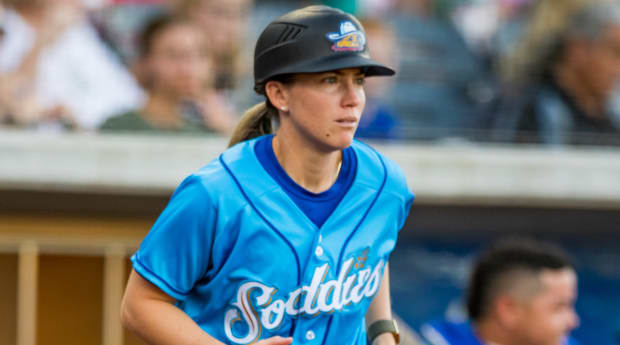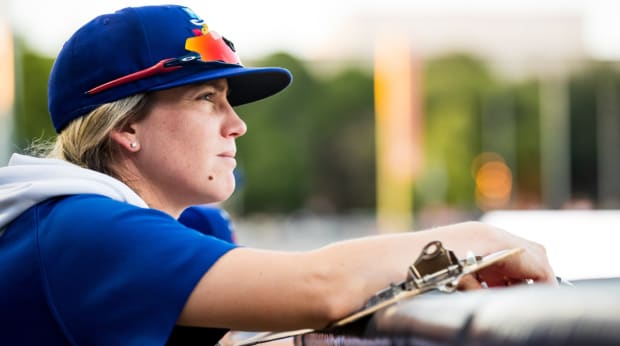Ronnie Gajownik, fresh off a season coaching in Double A and the Arizona Fall League, and one of only 11 women coaches in pro baseball, was cleaning her blinds one day in October when the phone rang. It was Josh Barfield, the Diamondbacks’ farm director.
After exchanging greetings, Barfield told her, “We want to talk to you about next season. So, we’d like you to be in Hillsboro ... wait. Hold on. I’m getting another call.”
What seemed an eternity passed. Based in Oregon, the Hillsboro Hops of the Northwest League are the High A affiliate for Arizona. Gajownik spent 2021, her first season in pro ball, there as a video assistant. But what role did Barfield have in mind for her this year? Minutes passed—maybe only five, but long enough for the suspense to build. Finally, Barfield returned from hold.
“Hey, Ronnie, you still there?”
“Yeah. I’ve been here for an hour. How’s it going?”
And then Barfield delivered the game-changing, history-making news.
“We want you to go ahead and manage up in Hillsboro.”

John E. Moore III/Getty Images
Eight years ago, Gajownik was playing softball for the University of South Florida and baseball for the U.S. women’s national team, which won gold at the Pan Am Games. Three years ago, she was the hitting and outfield coach for the UMass-Amherst softball team. And now, after two seasons in pro baseball, she is the first woman manager of a High A team. The only other woman manager, Rachel Balcovec, will soon start her second season as manager of the Low A Tampa Tarpons.
“It was shock. It was excitement,” says Gajownik, a guest on my podcast with World Series–winning manager Joe Maddon, The Book of Joe. “I got off the phone and my wife looked at me and said, ‘So where are you going?’ I told her, and she cried for the both of us. I appreciated that so I didn’t have to cry. It was a great moment.”
Gajownik, 29, waited to tell her parents, Marcel and Glenn, in person. She told them she was assigned to Hillsboro. Then, tipping them off to a manager’s duties in High A, said, “Can you make sure I’m in the right spot in the third-base coaching box?”
Says Gajownik, “My mom caught it before my dad. My dad started tearing up. My mom started tearing up. It was a really cool moment to do it in person.”
That Ronnie Gajownik—her given name, Veronica, she says is reserved for when her mom wants her to do the dishes—is a minor league manager after just two seasons in pro ball tells you how highly the Diamondbacks believe in her leadership skills. It also tells you how quickly mindsets have changed in baseball.
“If I look back at my five-year plan, there’s no shot I would be where I am at today,” she says. “It was definitely out of left field. ... Growing up there weren’t female coaches on the field in professional baseball. A dream job is something you can achieve. That was something growing up I never thought I could do. So I never really thought about it. I wanted to work hard and show who I was and what I could bring to the table, and this is what was on the table when Josh gave me that call.
“I heard something where they were asking people if they thought there will be a female [major league] manager in the next 10 years, and a lot of people were saying yes. So, the fact that it is being said by people who have been in this game or scouted in this game or broadcasted in this game for a long time, I think it’s great to hear. That can be on a female’s five-to-10-year plan and that’s something not even two or three years ago was a thought. The fact you’re asking that question now shows the progress made—that if you deserve to be here, you can be here.”
Gajownik inherited Glenn’s love of baseball and the Cubs in particular. (She wears number 34 as an homage to former Cubs ace Kerry Wood.) Growing up in central Florida, she would skip school occasionally to visit spring training camps with her dad.
“We would go to baseball games, talk baseball, even play baseball,” she says. “When I switched over to softball, he would still want me to hit with a wooden bat.”
Her goal was to be a softball coach. Then a diversity initiative by Major League Baseball and USA Baseball during the COVID-19 2020 season changed everything. They invited coaches, scouts and analysts to speak to USA Baseball alums over Zoom calls.
“I was just asking a bunch of questions,” Gajownik says.
Her questions were so insightful that they caught the attention of Marlins general manager Kim Ng and Liz Benn, the director of major league operations for the Mets. They sent Gajownik an email asking whether she had interest in getting into baseball.
“I thought, That’s pretty interesting,” she says.
MLB circulated her résumé. It invited her to join virtual instructional camps. Three major league organizations contacted her. The Diamondbacks offered her a job as a player development intern.
“I was pretty happy at UMass,” she says. “But I also wanted a little bit of a change and a little bit of a challenge and to see how things were done in professional baseball. So I looked at my wife and I said, ‘Hey, are you good with selling our place here and going over to the West Coast?’ And she said, ‘Let’s go ahead and do it.’ So that opened my door.”
After a year at Hillsboro, Gajownik was assigned to coach in the Rookie Arizona Complex League. But when Javier Colina, coach of the Double-A Amarillo Sod Poodles, injured his foot when he was struck by a ball in the batting cage, Arizona sent her there to replace him.

John E. Moore III/Getty Images
Asked to identify her strengths, Gajownik mentions communication skills, middle infield play, hitting, modern pitching metrics and “paying attention—being around the right people and learning from them.” Among her most influential mentors, she says, are softball coaches Kevin Fagan and Ken Eriksen and Diamondbacks minor league pitching coach Shane Loux.
“I’ve already started writing down some of the values we want at Hillsboro, and it comes down to being able to create that relationship with them, not [only] as a player but [also] as a person,” Gajownick says. “You can’t truly create progress until you tell the truth and you’re able to look in the mirror and see where your pros are, where your cons are, to be able to say, Hey, these are the things we need to be better at, and be vulnerable. If you’re not O.K. with looking at failure and how to get better, then you’re just going to be stagnant. Hey, we’re here; we’re all going to be vulnerable. We’re all going to look at how we can get better. And we’re here with you to get you better.”
The Hops begin their season April 6 in Pasco, Wash., against the Tri-City Dust Devils. Marcel and Glenn can check the positioning of the manager in the third-base coaching box and proudly know that is their daughter making history. Moreover, any girl or young woman can see Gajownik and know what is possible. It is the stuff dreams are made of—dreams that until only a few years ago never occurred to her.
“I never thought I would be in a role like this because I never saw it,” she says. “And the fact is that little girls that come down to spring training or they’re watching their brothers play baseball and they see Olivia Pichardo, who is playing at Brown, and they can say, ‘Can I play, too?’
“You might still get some people who say, ‘No, you shouldn’t do that.’ But there’s going to be a lot more people who say, ‘You know what? You can! You know why? She’s doing it and she’s doing it and she’s doing it …’
Baseball is now an option for a greater number of women, Gajownik says. And having more women in baseball makes it easier for even more to join them. The number of women in the game is “just going to get larger and larger,” to the point where women won’t need to be identified as “the first this or that.”
“It’s going to be second nature,” she says. “It’s going to be normal.”







